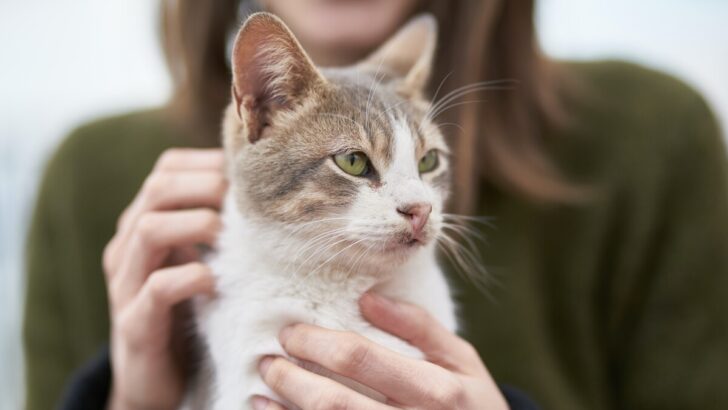Vicks is a popular medication many people use when they want to get rid of a nasty bout of flu. But is Vicks safe for cats? Should our furbabies ever come near it? Or should we keep this medication out of paw’s reach?
I think we can all agree that any medication intended for human use should never be used on any pets, not just felines.
Most of the time, the medication we find in our family’s or friends’ medicine cabinets is not the safest option for us to use. Why? Because every person is different and has different needs. Something that works for your mom and relieves her of her annoying headache, might not work for you.
In fact, if you are not careful enough, it can even have serious and detrimental consequences.
The same thing applies to our feline friends. Except, in their world, the misuse of certain medications intended for humans only has more severe consequences.
So, is Vicks safe for cats? What will happen if our fluffballs accidentally inhale it? Let’s find out!
Why do people use Vicks products?

If you’ve ever been sick (who hasn’t, right?) then you’ve probably used at least one of the famous Vicks products – either the soothing Formula 44, VapoSteam, NyQuil, or everyone’s all-time favorite VapoRub.
This brand made its name for producing some highly effective over-the-counter medicine that has helped many generations during all those annoying flu seasons. Their advantage doesn’t only lie in the effectiveness of the medicine but also in its budget-friendly price point.
People love this brand, especially Vicks VapoRub because it instantly relieves them of minor coughs and throat irritations. However, this medicine is also fairly versatile. People use VapoRub whenever they have minor muscle or joint pain or different conditions like nail fungus or dry skin. Yup, you heard that right!
This medication is only intended for transdermal use and should never be orally administered.
It is also suggested that this medication is never used on children younger than the age of 2, and adults who are allergic to some ingredients, are pregnant, or have emphysema. In any case, it is best to consult your healthcare provider before using Vicks VapoRub (or any other Vicks product, for that matter).
But what about our beloved feline friends? Is Vicks safe for cats?
What is Vicks made from?
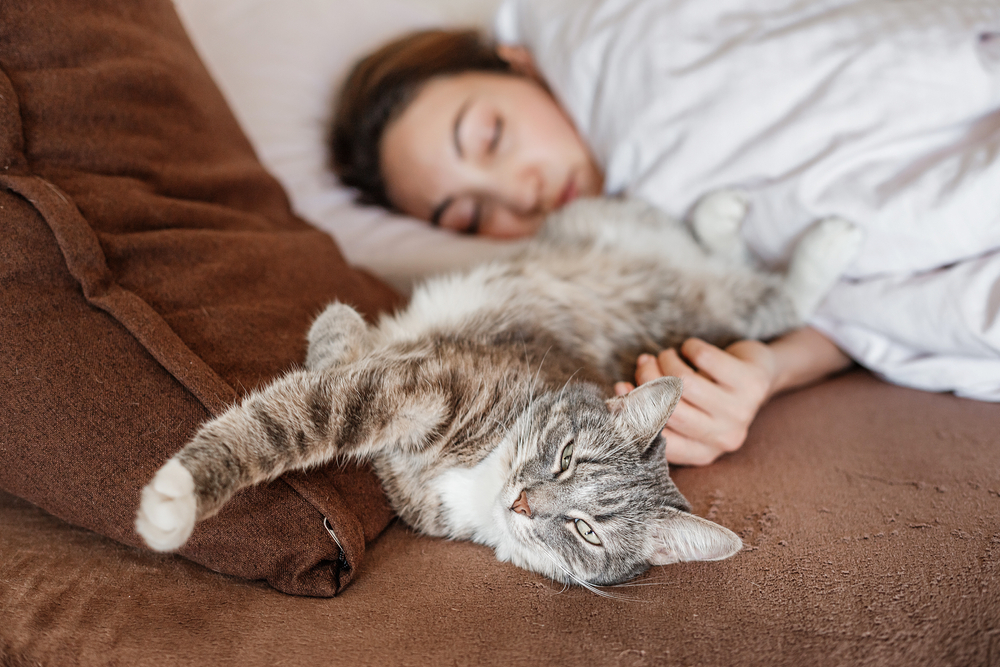
Before we move on with today’s concern, let’s first check out the list of ingredients used in the production of Vicks VapoRub.
According to its label, VapoRub’s main active ingredient is camphor. Camphor is a waxy whitish substance usually manufactured from the distillation of the bark and wood of the camphor tree or made from turpentine oil.
Camphor has a very strong and distinctive smell which acts as an amazing nerve stimulant and helps to relieve symptoms like pain and itching. It is worth mentioning that the Pet Poison Helpline includes camphor on their list, labeling it with mild toxicity levels.
The second ingredient on the list is eucalyptus oil. This oil is a natural remedy known for its many benefits like disinfecting wounds, promoting scalp health, boosting immunity, relieving a stuffy nose, easing sore muscles, and so on.
In the feline universe, eucalyptus oil can be used as a very effective peeing deterrent. However, it’s never advised to use this oil on cats since it can be very toxic for them.
The third ingredient is menthol, which is naturally found in peppermint and other minty plants, but can also be chemically produced in a lab. It is usually used for cramps, muscle pains, sprains and strains, headaches, skin irritations, pain associated with sciatica, and so on.
Menthol too can be toxic to cats, especially if used in large amounts.
Other, inactive ingredients include:
- cedar leaf oil
- nutmeg oil
- petroleum jelly (petrolatum)
- thymol
- turpentine oil
All of these inactive ingredients can also trigger serious reactions in felines.
Is Vicks safe for cats?
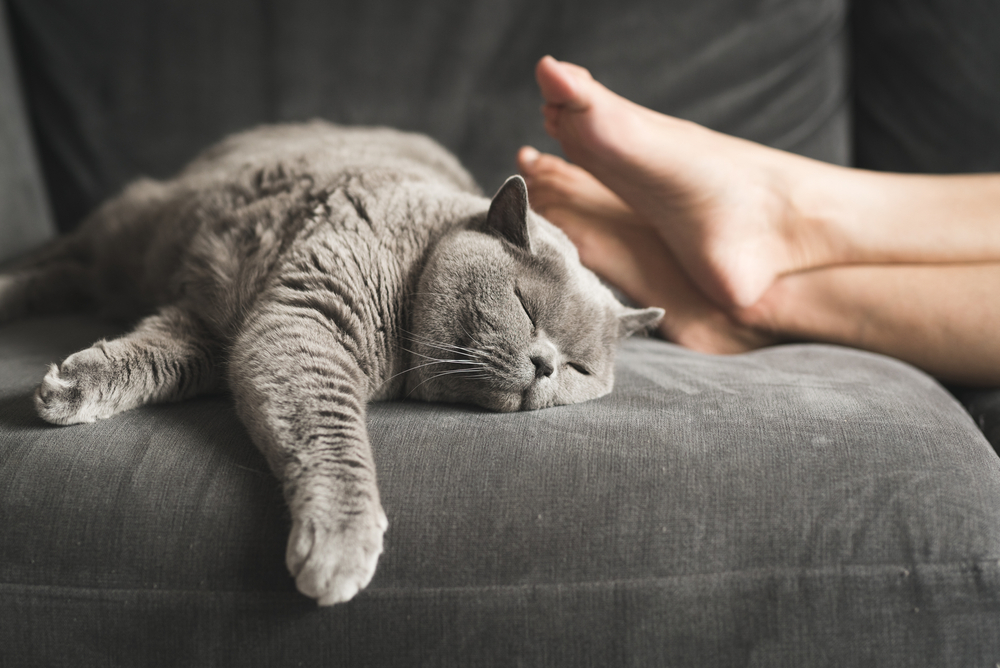
After having gone through the list of ingredients for Vicks VapoRub, I think we can all agree that Vicks, of course, is not safe for cats.
Every single ingredient listed on Vicks VapoRub label is in some way, either mildly or extremely, toxic to our beloved feline companions. Therefore, this medication should never be used on our poor fluffs.
Also, if you use Vicks VapoRub on yourself, make sure your kitty cannot reach you until your skin completely absorbs the medication. This is an extremely important precautionary measure to take and if you fail to do so, you may harm your cat.
So, please be sure your fluff does not lick the area where you have applied Vicks VapoRub. You don’t want to play with fire, especially when it’s your cat’s life on the line.
Bear in mind that you should never use any Vicks product on your cat since exposure can have life-threatening consequences.
What will happen if your kitty licks Vicks VapoRub off your skin?
Let’s say you weren’t careful enough. How could you be, really? You caught the flu, you are feeling awfully sick, and all you want to do is to get better and get some relief from the annoying pain. In that condition, ain’t nobody has time to pay attention to what their cat is doing.
So, if your cat happens to lick some of the VapoRub off your skin, make sure you call your vet immediately. Trust us, there is no time to wait, especially not if you suspect your fluff consumed a significant amount of VapoRub.
Some common symptoms of camphor poisoning (the main active ingredient of Vicks VapoRub) include:
- vomiting
- diarrhea
- nausea
- excessive salivation
- skin irritation (if your cat got VapoRub on her paws or other body parts)
- seizures
- depression
If you notice any of these symptoms, contact your cat’s vet right away or get in touch with Pet Poison Helpline. They are a 24/7 animal poison control center, and will gladly help you and your fluff. You can reach them at (855) 764-7661.
Why are felines attracted to the smell of Vicks VapoRub?
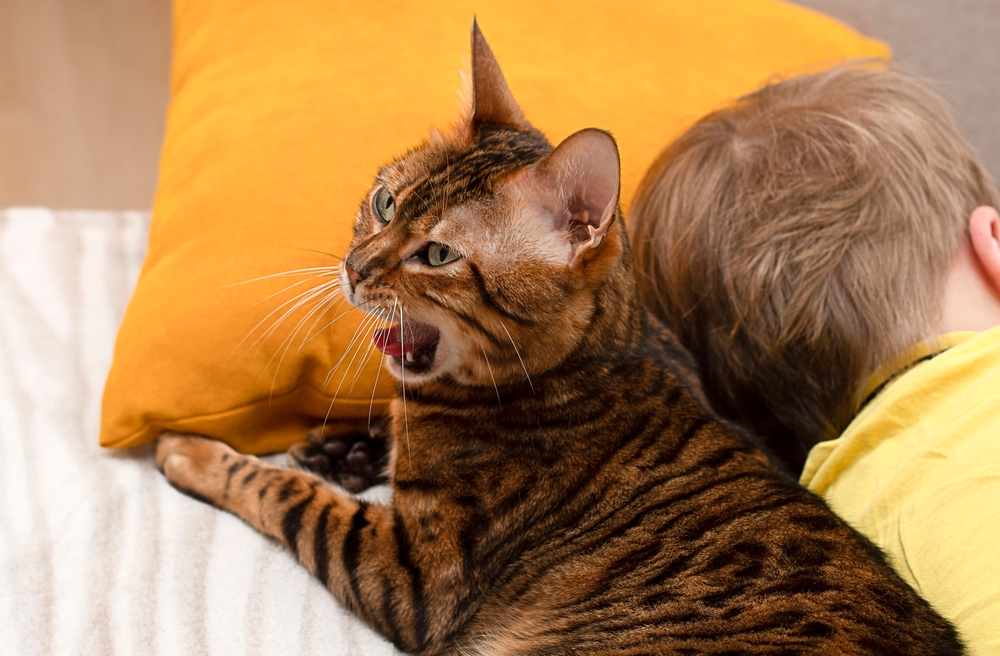
“Well, if VapoRub is so dangerous and toxic to cats, why is my kitty attracted to the smell of it? I swear, she loses her mind every time I open my Vicks VapoRub container.”
Is something like this going through your head right now? If so, then let’s give you a quick answer.
It is said that the feline sense of smell is 14 times better than ours. Can you imagine that? Your fluff senses something smelly 14 times better than you do. That also means whenever something smells bad in your home, she’s not having the time of her life.
Vicks VapoRub has a very strong scent that not many people like. But since they mostly use it when their nose is clogged, they are able to tolerate it.
But if we can barely stand the overpowering smell of VapoRub, imagine how it is for our feline friends. Sure, it is a strong scent, but their curious little noses simply have to see what that menthol is all about. You know how the saying goes, “Curiosity killed the cat.” (God forbid!)
Also, many people claim that cats are attracted to the smell of Vicks VapoRub because the smell of camphor inside has a similar effect as catnip does. How crazy is that?
But do not get confused. Just because catnip targets your fluff’s “happy” receptors in the brain and mellows her out, it does not mean that camphor will do the same. So, you should never let your kitty near Vicks VapoRub, no matter how persistent she gets.
Is there a feline-friendly decongestant medicine?
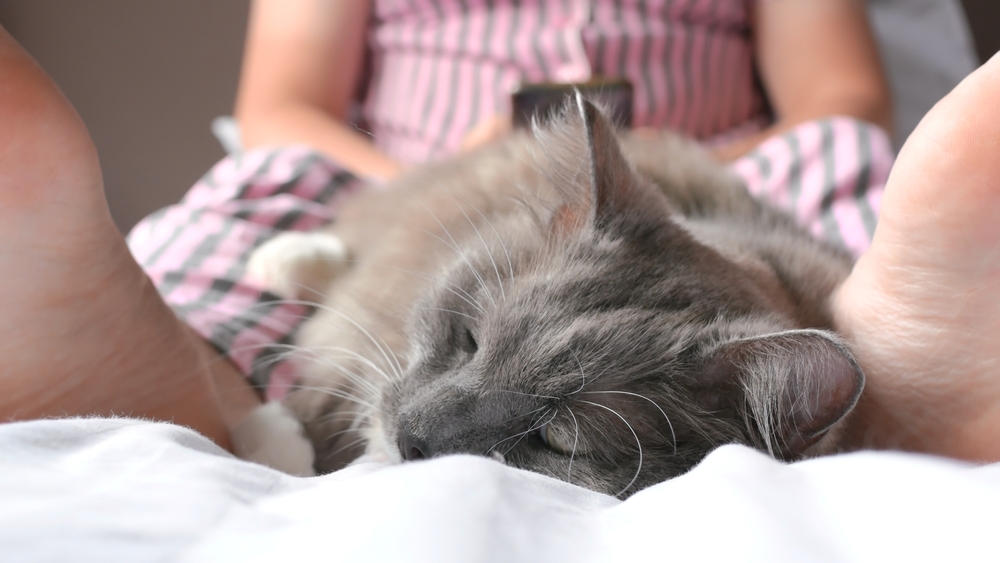
“Cats can have a stuffy nose?! For meowing out loud!”
It’s not nonsense. Cats can get congested, too, and this condition is otherwise known as feline rhinitis.
There are many decongestant medications for cats, but most of them are in fact prescription-based. This means that only the vet can prescribe them, which is a good thing since you should always consult him first before you give your kitty any type of medicine.
However, there are also a couple of over-the-counter solutions you can try if your kitty’s nose is congested. Their main purpose is to ease the symptoms and minimize the chance of your fluff’s condition getting worse.
Feline nasal sprays are popular over-the-counter decongestant medications, and they are pretty much available in any pet shop.
Other things you can try include guaifenesin, Benadryl, and Chlor-trimeton. These will only treat the stuffy nose, but will not target the underlying condition that’s causing it.
